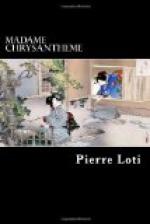At the outer gate I stop for the last adieu: the little sad pout has reappeared, more accentuated than ever on Chrysantheme’s face; it is the right thing, it is correct, and I should feel offended now were it absent.
Well, little mousme, let us part good friends; one last kiss even, if you like. I took you to amuse me; you have not perhaps succeeded very well, but after all you have done what you could: given me your little face, your little curtseys, your little music; in short, you have been pleasant enough in your Japanese way. And who knows, perchance I may yet think of you sometimes when I recall this glorious summer, these pretty quaint gardens, and the ceaseless concert of the cicales.
She prostrates herself on the threshold of the door, her forehead against the ground, and remains in this attitude of superlatively polite salute as long as I am in sight, while I go down the pathway by which I am to disappear for ever.
As the distance between us increases, I turn once or twice to look at her again; but it is a mere civility, and meant to return as it deserves her grand final salutation.
LIII.
On entering the town, at the turn of the principal street, I have the good luck to meet No. 415, my poor relation. I was just at that moment in want of a speedy djin, and I at once get into his vehicle; besides, it will be an alleviation to my feelings, in this hour of departure, to take my last drive in company with a member of my family.
Unaccustomed as I was to be out of doors during the hours of siesta, I had never yet seen the streets of the town thus overwhelmed by the sunshine, thus deserted in the silence and solitary brilliancy peculiar to all hot countries.
In front of all the shops hang white shades, adorned here and there with slight designs in black, in the quaintness of which lurks I know not what,—something mysterious: dragons, emblems, symbolical figures The sky is too glaring; the light crude, implacable; never has this old town of Nagasaki appeared to me so old, so worm-eaten, so bald, notwithstanding all its veneer of new papers and gaudy paintings. These little wooden houses, of such marvelous cleanly whiteness inside, are black outside, time-worn, disjointed and grimacing. When one looks closely, this grimace is to be found everywhere: in the hideous masks laughing in the shop fronts of the innumerable curio-shops; in the grotesque figures, the playthings, the idols, cruel, suspicious mad;—it is even found in the buildings: in the friezes of the religious porticos, in the roofs of the thousand pagodas; of which the angles and gable-ends writhe and twist like the yet dangerous remains of ancient and malignant beasts.




